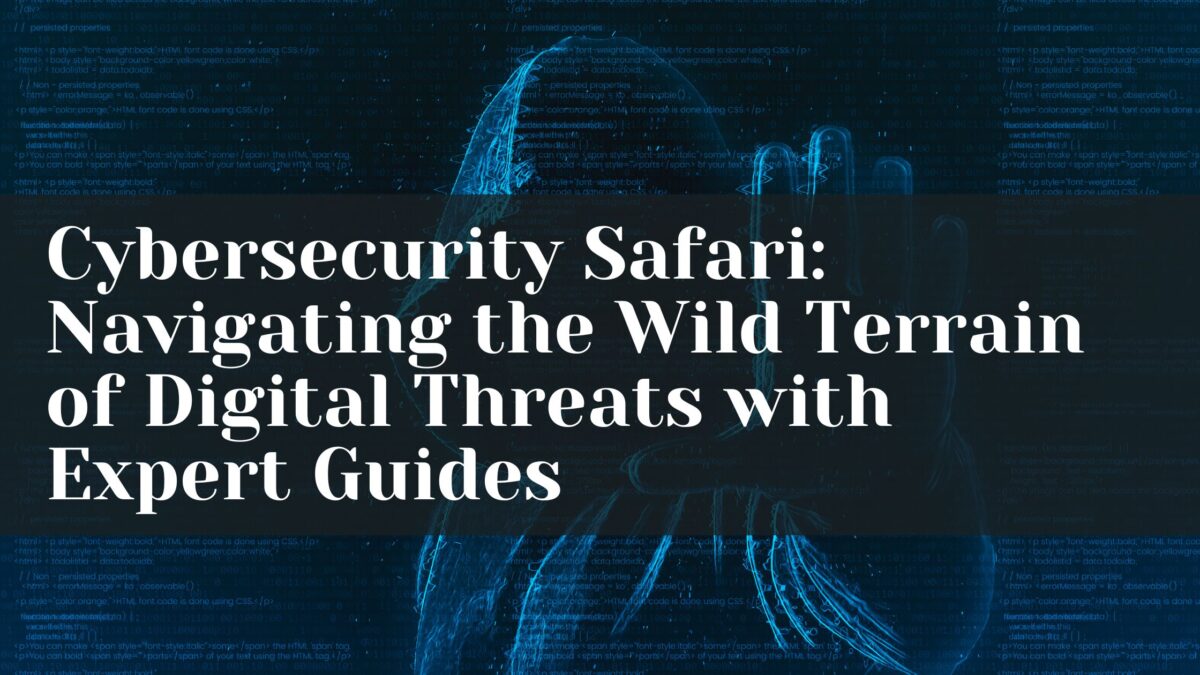Cybersecurity Safari: Navigating the Wild Terrain of Digital Threats with Expert Guides

In today’s digital age, the internet is akin to a vast, untamed wilderness teeming with wonder and danger. Cyber security consultation leads individuals through perilous landscapes like a safari guide navigating nature’s wild terrains. In this blog, we go through cybersecurity’s diverse and challenging landscape. However, we will explore the roles and strategies of these expert guides in safeguarding against digital threats.
Understanding the Digital Wilderness
The vast cyberspace wilderness encompasses interconnected networks, devices, and systems. Within this realm, cyber threats lurk in various forms, from malware and phishing attacks to ransomware and data breaches. These threats pose risks to people, businesses, and governments, leading to potential financial loss and data compromise.
The Role of Cybersecurity Guides
Cyber security firms possess a deep understanding of the digital terrain and the ever-evolving tactics employed by cyber adversaries. Their duty surpasses installing firewalls and antivirus; they vigilantly scan for threats and develop strategies to minimize risks.
Risk Assessment and Analysis
- Identifying Vulnerabilities: Cybersecurity companies conduct comprehensive risk assessments to identify vulnerabilities within systems, networks, and applications. It examines software, hardware, configurations, and human behavior weaknesses that cyber attackers could exploit.
- Threat Intelligence: Leveraging threat intelligence sources, companies gather information about emerging cyber threats, attack patterns, and malicious activities. The data lets them stay updated on evolving threats and prepare proactive defense strategies.
Implementing Robust Security Measures
- Firewalls and Intrusion Detection/Prevention Systems (IDS/IPS): Cyber security consultation helps deploy firewalls and IDS/IPS solutions to monitor incoming and outgoing network traffic. These systems identify and block suspicious activities or potential threats.
- Endpoint Security: Employing endpoint protection tools like antivirus software, endpoint detection and response solutions, and mobile device management to secure devices like computers, smartphones, and tablets.
- Encryption and Data Protection: Implementing encryption protocols to secure sensitive data at rest and in transit. It guarantees that even if data is intercepted, it stays indecipherable to unauthorized individuals or entities.
Security Awareness Training
- Educating Employees and Users: Providing regular cybersecurity awareness training to employees and end-users. It includes teaching them about social engineering, secure password practices, and recognizing suspicious activities to prevent accidental security breaches.
Continuous Monitoring and Incident Response
- Real-Time Monitoring: Cyber security firms utilize advanced security monitoring tools and SIEM systems to monitor networks for security breaches continuously. It enables companies to detect and respond promptly to potential threats.
- Incident Response Planning: Having well-defined incident response plans in place to efficiently address security incidents if they occur. It includes steps for containment, eradication, recovery, and post-incident analysis.
Regular Security Audits and Compliance Checks
- Security Audits: Conduct regular security audits and penetration testing to assess the effectiveness of existing security measures. This helps in identifying gaps and areas that require improvement.
- Compliance Adherence: Ensuring compliance with industry-specific regulations and standards to protect sensitive data and maintain customer trust.
Adoption of Advanced Technologies
- AI and Machine Learning: Cyber security consultation helps leverage AI and machine learning technologies to more accurately analyze and predict potential threats. It assists in detecting anomalies and unthreats.
- Behavioral Analysis: Implementing behavioral analysis techniques to monitor user behaviors and detect abnormal activities that deviate from typical patterns.
Collaboration and Information Sharing
- Partnerships and Information Exchange: Engaging in collaborative efforts and sharing threat intelligence within the cybersecurity community. It helps in staying updated on emerging threats and adopting effective defense strategies.
Cybersecurity companies employ a multifaceted approach to prevent and mitigate digital threats. Their proactive and comprehensive strategies are crucial in safeguarding against the ever-evolving landscape of cyber risks.
How to Choose Cyber Security Consultation Provider?
Choosing a cybersecurity services provider is a critical decision for any organization.
- Assess Your Needs: Determine your organization’s specific cybersecurity needs, whether they are network security, compliance, risk assessment, incident response, or other areas. Understanding your requirements will help in identifying the most suitable consultancy.
- Evaluate Expertise and Experience: Look for consultants with a proven track record in cybersecurity. Check their experience, certifications, case studies, and client testimonials. Consider their expertise in your industry and the types of security challenges they’ve handled.
- Check Certifications and Credentials: Ensure the consultancy and its members hold relevant certifications. These certifications showcase their proficiency in the field.
- Assess Reputation and References: Research the cyber Security consultation provider’s reputation in the industry. Check reviews of client references and ask for referrals from other businesses or professionals in your network.
- Discuss Budget and Cost: Understand the consultancy’s pricing structure and ensure it aligns with your budget. However, don’t compromise quality for cost. Invest in reliable and reputable services that meet your needs.
- Evaluate Flexibility and Scalability: Ensure the consultancy can adapt to your organization’s evolving needs. Check if they offer scalable solutions that can grow with your business.
- Discuss Continued Support and Training: Cyber threats evolve constantly, so ongoing support and training are crucial. Inquire about post-implementation support, training programs, and resources to update your team on cybersecurity best practices.
- Contractual Agreements and Legal Considerations: Review contracts thoroughly. Ensure that confidentiality, data handling, liability, and other legal aspects are clearly defined and agreeable.
- Trust and Rapport: Finally, trust your instincts. Establishing a good rapport with the consultancy is crucial since they’ll be handling sensitive information & helping protect your organization.
By carefully considering these factors, you can find a cybersecurity services provider that meets your organization’s specific needs.
Conclusion: Towards a Secure Digital Expedition
Nowadays, it has become evident that cybersecurity experts are unsung heroes guiding us through this challenging journey. Their expertise, vigilance, and innovative strategies are essential in safeguarding against the myriad threats in the digital wilderness. Businesses and individuals should acknowledge these experts’ pivotal role and prioritize robust cybersecurity measures for a safe digital journey. Reliable cyber security consultation is essential to safeguard organizational and personal digital landscapes. As safari guides ensure safe wildlife journeys, cybersecurity experts enable swift and secure digital experiences.











